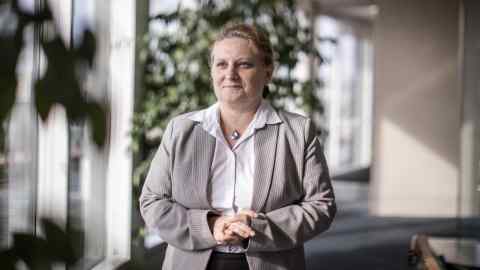When Richard Locke at MIT’s Sloan University of Administration was investigating Nike’s method to corporate responsibility in the early 2000s, he came across information on labour specifications in its factories that sparked reforms significantly past the sportswear producer.
His experience provides a pointer to how organization educational facilities can function with organization to deliver about constructive social transform, bridging a divide involving concepts and observe that critics argue remains significantly far too huge.
Right after lengthy negotiations to attain obtain to corporate data and flexibility to publish his conclusions, Prof Locke, now provost at Brown College, was equipped to exhibit the restricted performance of labour audits by itself in increasing operating disorders. Significantly higher progress came when they ended up mixed with measures to deal with underlying complications, this kind of as instruction and enabling suppliers to timetable their function greater.
The conclusions, disseminated in excess of a quantity of decades in seminars and in consultations with administrators, unions and policymakers as very well as in educational journals and more available publications, aided spark new guidelines at multiple businesses.
“It’s particularly critical for students in organization educational facilities to test to handle some of society’s excellent issues by their exploration,” he suggests. “By bringing a demanding methodology, you can each demonstrate your educational abilities and deliver new exploration to not only transform the way we believe, but do so with implications in the serious planet.”
For numerous, this kind of illustrations continue being far too unusual. In a 2018 report in BizEd, a journal of the Affiliation to Advance Collegiate Educational facilities of Business, William Glick from Rice College, Anne Tsui from the College of Notre Dame and Gerald Davis from the College of Michigan delivered a damning verdict. “With a couple noteworthy exceptions,” they wrote, “scholarly exploration almost never reaches the worlds of organization or coverage, and educational journals are neither browse nor cited broadly past the educational neighborhood.”
The a few organization faculty professors believed that the establishments accredited by the AACSB used virtually $4bn a yr on exploration. This, they remarked, is “a incredibly substantial cost with incredibly restricted accountability — and no systemic controls to align the exploration with the interests of the funding resources.”
Shareholders or stakeholders?
Prof Davis, a joint founder of the Dependable Research in Business Administration (RRBM) network, suggests that while there have been exceptions, the broader impression of exploration has been modest and often even negative.
Creating in the Journal of Administration Studies in Oct, he offers a broadly cited 1976 report by Rochester College professors William Meckling and Michael Jensen which produced the reductionist scenario for a concentrate by organizations on “shareholder value”. This notion, drummed into organization faculty students for a few many years, has, he argues, experienced pernicious effects, and clashes with today’s expanding awareness that organization has obligations to a wide team of stakeholders.
Dependable Research in Business Administration seeks to inspire impressive, demanding educational exploration that has simple implications for societal problems this kind of as sustainability. It delivers awards just about every yr for papers that add to this target.
But dissenters — which include one FT subscriber and organization faculty educational — argue that it can acquire numerous decades for educational concepts to be adopted by organization, and that the requires of the marketplace provide the best alerts to guideline exploration and educating. To refocus on recent social priorities this kind of as sustainability challenges “greenwashing”.
Past this kind of conceptual criticism, RRBM’s attempts experience simple road blocks far too. One particular constraint, as Debra Shapiro from the College of Maryland and Bradley Kirkman from North Carolina State College have argued, is that faculty using the services of and advertising is noticeably based mostly on publications in prestigious educational journals. That makes an incentive to concentrate on creating substantial volumes of usually theoretical function with restricted applicability and couple viewers.
As if to underline their level, they posted their views in the Harvard Business Evaluate, which, however provided scant credit rating in regular educational circles, is broadly browse by administrators. Adi Ignatius, the editor in main, cites multiple posts that have experienced serious-planet impression: 2019’s “Operational Transparency”, for illustration, gained a lot praise from senior executives, as well as invites for its author, Ryan Buell of Harvard Business University, to discuss at multiple businesses.
But that suggests a even more issue with attempts to persuade impactful exploration. A “magic bullet” of an HBR report may perhaps stand for an great, but the dissemination of concepts is ordinarily a slower, messier and more unpredictable procedure. It is hard to evaluate systematically, and usually will involve intermediaries past the initial educational. Consultants and executives may perhaps also be unwilling to give others credit rating for the concepts they adopt.
Advocates for more simple, socially liable exploration propose intensified contact involving teachers, practitioners and policymakers to exchange concepts, learn from just about every other and build exploration jointly — while backed up by mechanisms to assure rigour, independence and transparency.
As Prof Locke argues: “The academic’s brain is skilled in sure exploration abilities. Acquiring a organization faculty embedded in a larger university with the infrastructure for exploration integrity is actually critical.”






More Stories
How Related Are Small Businesses and Existing Financial Management Theories and Concepts?
How to Attain Financial Stability in Your Business
New Business Loans – Removes All Financial Barriers